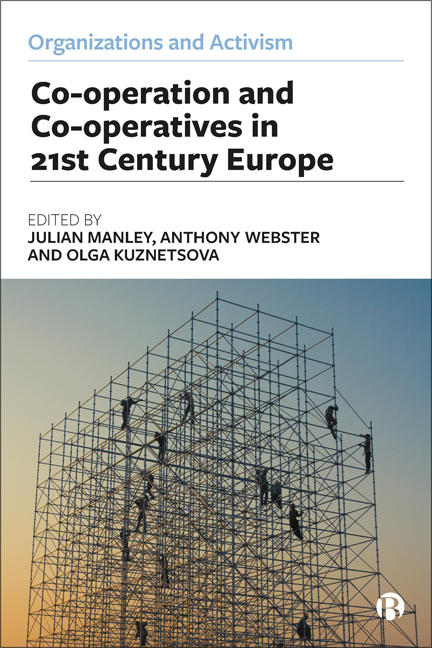Book contents
- Frontmatter
- Dedication
- Contents
- Series Editors’ Preface
- List of Figures and Tables
- List of Abbreviations
- Notes on the Contributors
- Acknowledgements
- Foreword
- 1 Introduction: European Co-operativism in a Changing World
- PART I Seeds: Identifying the Space for Co-operatives in Addressing Social Challenges
- PART II Bridges: Co-operative Culture and Education
- PART III Growth: The Preston Model, Co-operation and Community Wealth Building
- Index
2 - Star & Shadow Cinema: A Grassroots Interface between DIY Culture, New Co-operativism and the Commons
Published online by Cambridge University Press: 28 March 2024
- Frontmatter
- Dedication
- Contents
- Series Editors’ Preface
- List of Figures and Tables
- List of Abbreviations
- Notes on the Contributors
- Acknowledgements
- Foreword
- 1 Introduction: European Co-operativism in a Changing World
- PART I Seeds: Identifying the Space for Co-operatives in Addressing Social Challenges
- PART II Bridges: Co-operative Culture and Education
- PART III Growth: The Preston Model, Co-operation and Community Wealth Building
- Index
Summary
Introduction
Star & Shadow Cinema Co-op (S&S) in Newcastle upon Tyne exemplifies a recent pattern of the rediscovery of cinema as a form of dissent against neoliberalism, prefiguring different possibilities for cinema – and as an extension city-making as a spatially located ‘social practice’ celebrating community, democracy and freedom through the production of urban commons. Adopting an everyday utopian approach to the constituent relations of the cinema screening event – its place, apparatus, organization, audience relations and aesthetics – this mode has been defined as DIY film exhibition (Wallers, 2021). S&S is a 100 per cent volunteer-run cinema and social centre in Newcastle upon Tyne, that evolved out of screening projects between 2001 and 2005 at the Side Cinema and other artist-run spaces. It started as a loose collective of cinema enthusiasts who wanted to organize public film screenings, variously interested in alternative film, artists’ moving image, LGBTQ+ cinema and activist documentaries to inform and inspire direct action. They moved to derelict warehouse premises on the edge of one of Newcastle's urban regeneration zone, the Ouseburn, and built a screening space and music venue from scratch, all as volunteers, brushing up on (or teaching themselves) building skills as they went along. Their public programme diversified even more, and as a result the open organizational structure meant that over 1000 volunteers came through the doors and participated actively in sustaining the project. Caught in a typical gentrification cycle in a prime development location, S&S had its lease terminated in 2014, but the story was far from over.
A root urban problem for projects like S&S lies in the asymmetrical power structures that afford big capital the control to dictate the fate of urban space through private ownership. This poses questions for those who envision alternatives, about proactive legal approaches that can protect urban commons on a more long-term basis. In the case of Serbia for example, cinema spaces in Belgrade are but one of many previously state-owned assets that are at risk of top-down privatization, a pattern that commons-activists are doing their best to resist (Čukić and Timotijević, 2020). What models exist in the UK to contest and reverse this form of enclosure and increase democracy in how urban space is managed?
- Type
- Chapter
- Information
- Publisher: Bristol University PressPrint publication year: 2023

